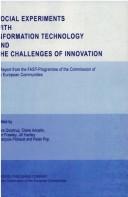| Listing 1 - 10 of 16 | << page >> |
Sort by
|
Book
ISBN: 1780745192 Year: 2015 Publisher: New York : Oneworld Publications,
Abstract | Keywords | Export | Availability | Bookmark
 Loading...
Loading...Choose an application
- Reference Manager
- EndNote
- RefWorks (Direct export to RefWorks)
Coal, iron ore and oil were the fuel of the Industrial Revolution. Today's economies and governments are powered by something far less tangible: the explosive abundance of digital data.Steve Lohr, the New York Times' chief technology reporter, charts the ascent of Data-ism, the dominating philosophy of the day in which data is at the forefront of everything and decisions of all kinds are based on data analysis rather than experience and intuition. Taking us behind the scenes and introducing the DOPs (Data Oriented-People), the key personalities behind this revolution, he reveals how consuming


ISBN: 9027724881 9789027724885 Year: 1987 Publisher: Dordrecht Boston Lancaster : D. Reidel Publishing Company ;,
Abstract | Keywords | Export | Availability | Bookmark
 Loading...
Loading...Choose an application
- Reference Manager
- EndNote
- RefWorks (Direct export to RefWorks)
Electronic data processing --- Technological innovations --- Informatique --- Innovations --- Social aspects. --- Aspect social --- Information technology --- Social aspects --- Electronic data processing - Social aspects --- Technological innovations - Social aspects --- Information technology - Social aspects
Book
ISBN: 1529215161 1529215145 1529215153 9781529215144 1529215641 9781529215649 9781529215151 Year: 2021 Publisher: Bristol Bristol University Press
Abstract | Keywords | Export | Availability | Bookmark
 Loading...
Loading...Choose an application
- Reference Manager
- EndNote
- RefWorks (Direct export to RefWorks)
Rob Kitchin explores how data-driven technologies have become essential to society, government and the economy. Blending scholarly analysis, biography and fiction, he demonstrates how data influence our daily lives.
Book

ISBN: 0907567347 0907567355 9780907567356 9780907567349 Year: 1982 Volume: 7997 Publisher: Dublin : Tycooly International,
Abstract | Keywords | Export | Availability | Bookmark
 Loading...
Loading...Choose an application
- Reference Manager
- EndNote
- RefWorks (Direct export to RefWorks)
Sociology of organization --- Economic sociology --- Electronic data processing --- Information society --- Information technology --- Informatique --- Société informatisée --- Technologie de l'information --- Social aspects --- Congresses --- Aspect social --- Congrès --- $ 88KL --- $ Information science and society --- Congresses. --- Société informatisée --- Congrès --- Electronic data processing - Social aspects - Congresses --- Information society - Congresses --- Information technology - Social aspects - Congresses

ISBN: 2707137367 9782707137364 Year: 2002 Publisher: Paris: La Découverte,
Abstract | Keywords | Export | Availability | Bookmark
 Loading...
Loading...Choose an application
- Reference Manager
- EndNote
- RefWorks (Direct export to RefWorks)
Communication --- Mass media --- Electronic data processing --- Médias --- Informatique --- Social aspects --- Aspect social --- Média --- Theorie de la communication --- Media --- Nouvelles technologies de l'information et de la communication. --- Médias --- Electronic data processing - Social aspects --- Mass media - Social aspects --- Communication - Social aspects --- Communication - Aspect social --- Médias - Aspect social --- Informatique - Aspect social
Book
ISBN: 2707117862 2890522547 9782707117861 Year: 1989 Publisher: Paris: La Découverte,
Abstract | Keywords | Export | Availability | Bookmark
 Loading...
Loading...Choose an application
- Reference Manager
- EndNote
- RefWorks (Direct export to RefWorks)
Média --- Mass media --- Electronic data processing --- Communication --- Theorie de la communication --- Media --- Médias --- Informatique --- Nouvelles technologies de l'information et de la communication. --- Social aspects --- Aspect social --- History --- 316.77 --- 659.3 --- Communication, Primitive --- Mass communication --- Sociology --- Mass communications --- Electronic data processing - Social aspects --- Mass media - Social aspects --- Communication - Social aspects --- Communication - Aspect social --- Médias - Aspect social --- Informatique - Aspect social --- COMMUNICATION --- MEDIAS --- ASPECT SOCIAL
Book
ISBN: 9780262536561 9780262353410 0262353415 0262536560 Year: 2019 Publisher: Cambridge, Massachusetts The MIT Press
Abstract | Keywords | Export | Availability | Bookmark
 Loading...
Loading...Choose an application
- Reference Manager
- EndNote
- RefWorks (Direct export to RefWorks)
A few decades into the digital era, scientists discovered that thinking in terms of computation made possible an entirely new way of organizing scientific investigation; eventually, every field had a computational branch: computational physics, computational biology, computational sociology. More recently, "computational thinking" has become part of the K-12 curriculum. But what is computational thinking? This volume in the MIT Press Essential Knowledge series offers an accessible overview, tracing a genealogy that begins centuries before digital computers and portraying computational thinking as pioneers of computing have described it. The authors explain that computational thinking (CT) is not a set of concepts for programming; it is a way of thinking that is honed through practice: the mental skills for designing computations to do jobs for us, and for explaining and interpreting the world as a complex of information processes. Mathematically trained experts (known as "computers") who performed complex calculations as teams engaged in CT long before electronic computers. The authors identify six dimensions of today's highly developed CT--methods, machines, computing education, software engineering, computational science, and design--and cover each in a chapter. Along the way, they debunk inflated claims for CT and computation while making clear the power of CT in all its complexity and multiplicity.
Computer algorithms --- Computer logic --- Electronic data processing --- Social aspects --- Algorithmes --- Logique informatique --- Informatique --- Aspect social --- Computers --- Office practice --- ADP (Data processing) --- Automatic data processing --- Data processing --- EDP (Data processing) --- IDP (Data processing) --- Integrated data processing --- Logic, Symbolic and mathematical --- Computer science logic --- Algorithms --- Automation --- Electronic data processing - Social aspects
Book
ISSN: 22953825 ISBN: 9782807332638 2807332633 Year: 2021 Publisher: Louvain-la-Neuve : [Paris] : De Boeck ; ADBS,
Abstract | Keywords | Export | Availability | Bookmark
 Loading...
Loading...Choose an application
- Reference Manager
- EndNote
- RefWorks (Direct export to RefWorks)
Depuis 2006, la conférence "Document numérique et société" se donne pour mission d'apporter des éclairages sur les transformations des dispositifs d'information à l'ère numérique, en privilégiant la dimension sociale. La 7e édition s'est tenue à l'Université de Lorraine (site de Nancy) en septembre 2020 et a été co-organisée par le laboratoie Dicen-Idf du Cnam et le Centre de recherche sur les médiations (Crem, UR 3476). Dans un contexte d'inflation grandissante des données, la conférence s'est donné pour objectif d'étudier les relations entre humains et données. Les actes se structurent selon trois dimensions abordées par les intervenants : les services numériques innovants, les différentes médiations en jeu et l'émergence de créations narratives.
Données massives --- Communication --- Société numérique --- Aspect social --- Innovations technologiques --- stockage de données --- système d'information --- document numérique --- gestion de l'information --- communication --- Electronic data processing --- Information technology --- Social aspects. --- Big data --- Information retrieval. --- Information organization --- Information society --- Information resources management --- Technological innovations --- Société numérique. --- Aspect social. --- Innovations technologiques. --- Electronic data processing - Social aspects. --- Information technology - Social aspects.
Book
ISBN: 0444864261 9780444864260 9780080871806 0080871801 1281797529 9786611797522 0444864229 9780444864222 Year: 1982 Volume: 2 Publisher: Amsterdam ; New York : New York, N.Y. : North-Holland Pub. Co. ; Sole distributors for the U.S.A. and Canada, Elsevier Science Pub. Co.,
Abstract | Keywords | Export | Availability | Bookmark
 Loading...
Loading...Choose an application
- Reference Manager
- EndNote
- RefWorks (Direct export to RefWorks)
Transmutation, Scattering Theory and Special Functions
Sociology of knowledge --- Computer. Automation --- Computers and civilization --- Electronic data processing --- Functions, Special. --- Information society --- Inverse problems (Differential equations). --- Scattering (Mathematics). --- Transmutation operators. --- Congresses. --- Government policy --- Social aspects --- Inverse problems (Differential equations) --- Scattering (Mathematics) --- BASIC (Computer program language) --- Infographie --- Operators, Transmutation --- Operator theory --- Scattering theory (Mathematics) --- Boundary value problems --- Differential equations, Partial --- Scattering operator --- Differential equations --- Special functions --- Mathematical analysis --- Computers and civilization - Congresses --- Information society - Congresses --- Electronic data processing - Social aspects - Congresses --- Electronic data processing - Government policy - Congresses
Book
ISBN: 2800408375 9782800408378 Year: 1984 Volume: 6 Publisher: Bruxelles : Editions de l'Université Libre de Bruxelles [U.L.B.],
Abstract | Keywords | Export | Availability | Bookmark
 Loading...
Loading...Choose an application
- Reference Manager
- EndNote
- RefWorks (Direct export to RefWorks)
Informatica --- Informatique --- Maatschappij --- Société --- Electronic data processing --- Social aspects --- -Informatiemaatschappij 002:304 --- 67.003 --- ADP (Data processing) --- Automatic data processing --- Data processing --- EDP (Data processing) --- IDP (Data processing) --- Integrated data processing --- Computers --- Office practice --- -technologie en samenleving (zie ook 331.156.2 STV) --- Automation --- Informatiemaatschappij 002:304 --- technologie en samenleving (zie ook 331.156.2 STV) --- Computers en beschaving --- Traitement électronique des données --- Elektronische gegevensverwerking --- Ordinateurs et civilisation --- Electronic data processing - Social aspects - Belgium --- Informatique et sciences humaines --- Vie sociale
| Listing 1 - 10 of 16 | << page >> |
Sort by
|

 Search
Search Feedback
Feedback About UniCat
About UniCat  Help
Help News
News